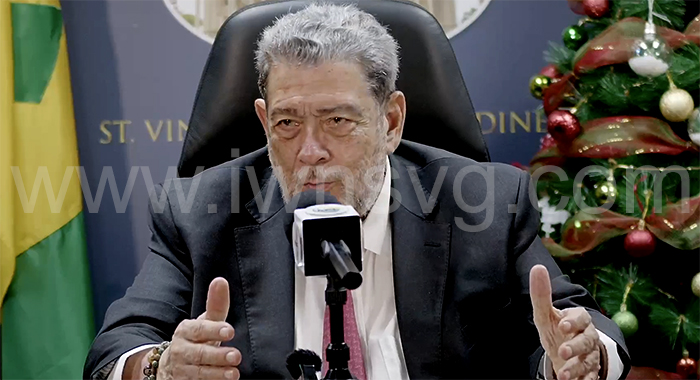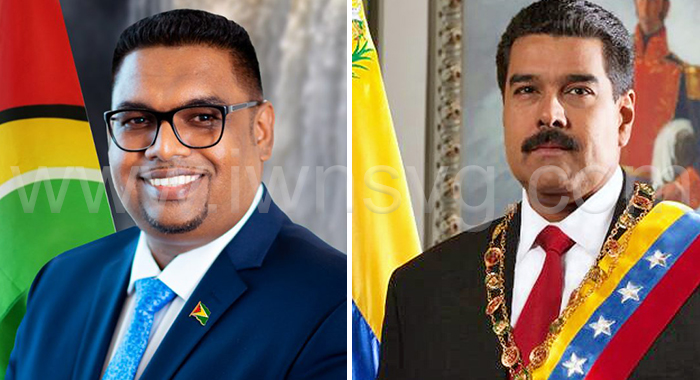GEORGETOWN, Guyana (CMC) — Guyana’s President Irfaan Ali, Tuesday, strongly objected to statements alluded to by Venezuela’s President Nicolas Maduro that their talks in St. Vincent on Thursday will “directly” address the territorial dispute between their two countries.
In a Dec. 12 letter to St. Vincent and the Grenadines Prime Minister, Ralph Gonsalves, who is facilitating the talks in Kingstown, Ali insisted that the controversy over the 1899 Arbitral Tribunal Award regarding the ownership of the Essequibo region in Guyana would be settled by the International Court of Justice (ICJ).
“I, too, have a mandate from the National Assembly of Guyana which is unanimous in its resolve that the land boundary is not a matter for bilateral discussions and the settlement of the matter is properly in the International Court of Justice where it must remain until the Court gives its final ruling on the merits of the case which, Guyana has always said, and I repeat, will be fully respected by Guyana,” Ali wrote.
The talks in Kingstown will also be attended by CARICOM chairman and Dominica’s Prime Minister Roosevelt Skerrit and Trinidad and Tobago’s Prime Minister Keith Rowley.
In his letter, addressing a number of “inaccuracies” contained in Maduro’s letter to him on Dec.11, Ali told Gonsalves, who is also the president pro-tempore of the Community of Latin American and Caribbean Countries (CELAC), that CARICOM leaders last Friday urged the “engagement” and called for “a de-escalation of the conflict through an appropriate dialogue between the leaders of Venezuela and Guyana to ensure peaceful co-existence, the application and respect for international law and the avoidance of the use or threats of force”.
“It is this framework for the meeting to which I have consented and to which I remain committed” Ali said, adding that he was prepared to speak with Maduro “on any other aspect that may contribute to improving and strengthening amicable relations between our two countries…
“I appreciate the efforts that you and my other CARICOM Colleagues are making to facilitate such a dialogue, as well as Brazil and other countries of CELAC, and wish to restate Guyana’s commitment to the peace and security of our region,” Ali wrote in his letter to Gonsalves.
He reminded that CARICOM leaders, including Gonsalves, had during last weekend’s meeting “clearly established” and “conveyed in the outcome statement” that there is “full support by CARICOM for Guyana of the resolution of its border controversy with Venezuela through the process of the International Court of Justice”.
In his Dec. 11 letter to Gonsalves, Maduro said that he welcomed the CELAC/CARICOM initiative to meet with Ali with the “hope that it becomes at a starting point towards the return of direct negotiations”.
Maduro said that that Venezuelans voted in a Dec. 3 referendum “for the defense of our legitimate rights over Guayana Esequiba” through a rejection of the boundary in the 1899 Arbitration Award, reaffirmed the route of negotiations under the 1966 Geneva Agreement “as the only way to reach a solution to the controversy” and not recognising the compulsory or mandatory jurisdiction of the ICJ.

“The imposition of the International Court of Justice, as an instance to seek a solution to the territorial dispute, is violative of the principle of mutual consent already agreed upon between the parties, which makes it one of the factors with the greatest impact and threatens deterioration. of the situation,” he said.
But Ali said that the Geneva Agreement of 1966 provides assurances of a final settlement by vesting in the Secretary-General of the United Nations the authority to choose the International Court of Justice as the means of settling the controversy in accordance with international law.
“That is what he did in 2018. The parties are bound by the Geneva Agreement to accept the ICJ as the means of settlement, and to accept the Judgement of the Court as the final settlement of the controversy,” Ali wrote.
The Guyanese leader also dismissed Maduro’s claims that Guyana’s oil concessions are “in a maritime area yet to be delimited” noting that, contrary to that misleading assertion, “all of the oil blocks are located well within Guyanese waters under international law, including the United Nations Convention on the Law of the Sea, which guarantees coastal States the exclusive rights to the resources in the sea and seabed within 200 nautical miles of their coasts”
Ali said that the oil blocks are all located adjacent to Guyana’s coast and within 200 nautical miles of it.
He said that in 2015, a significant oil discovery was made by Esso Exploration & Production Guyana Limited in the Stabroek Block approximately 120 miles offshore of Guyana. Production has since commenced and been carried on without interference from Venezuela. The 14 oil blocks included in the 2022 Licensing Bid Round are farther east of the boundary with Venezuela — and farther from the Venezuelan coast — than the Stabroek Block, he added.
As for the “further inaccurate allegation” by Maduro that there is “meddling of the United States Southern Command, which has begun operations in the disputed territory”, Ali said the Guyana government “maintains its sovereign right to engage in any form of cooperation with its bilateral partners and does not support intervention in the internal affairs of any other State”.
Ali denied that a military operation aimed at Venezuela exists “in any part of Guyanese territory” describing the statement as “false, misleading and provocative.
“Let me assure dear Colleague that I am prepared to speak with President Maduro on any other aspect that may contribute to improving and strengthening amicable relations between our two countries,” Ali wrote to Gonsalves.







If it is the same strategy that considered it just and right for a man to be shot at his home and two persons of note, a member of the DPP office and a sitting senator to walk scot free?.
Or is it the strategy is already in practice whereby the CoP, under whose watch crime spiralled out of control, was promoted to senior magistrate? And to add to that strategy the assistance to the CoP then, sat at alongside the and helped to usher in the record season number if murders
Like Chavez, Maduro is a bully, a man who has been responsible for destroying he lives and economy of the country through his dehumanizing socialist policies.
As of August 2023, more than 7.7 million people have left Venezuela, making it one of the largest external displacement crises in the world. Much like the Syrian refugee crisis, which remains the largest, the Venezuelan crisis has affected numerous lives.
Most Venezuelans have sought refuge in neighboring countries. Of the millions of people who have left Venezuela, the majority (approximately 6.1 million) have chosen to remain in Latin America and the Caribbean. Notably, Colombia has become the primary destination, hosting over 2.5 million refugees and migrants from Venezuela.
Once one of the richest countries in Latin America, today it is one of the poorest, all due incompetent Marxist governance.